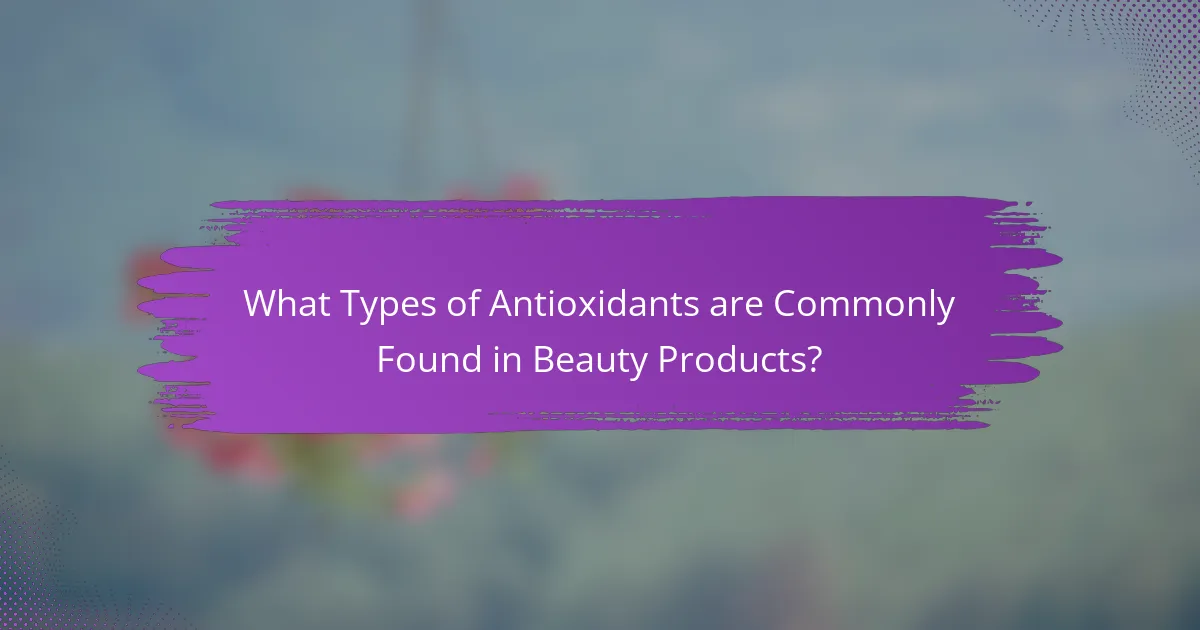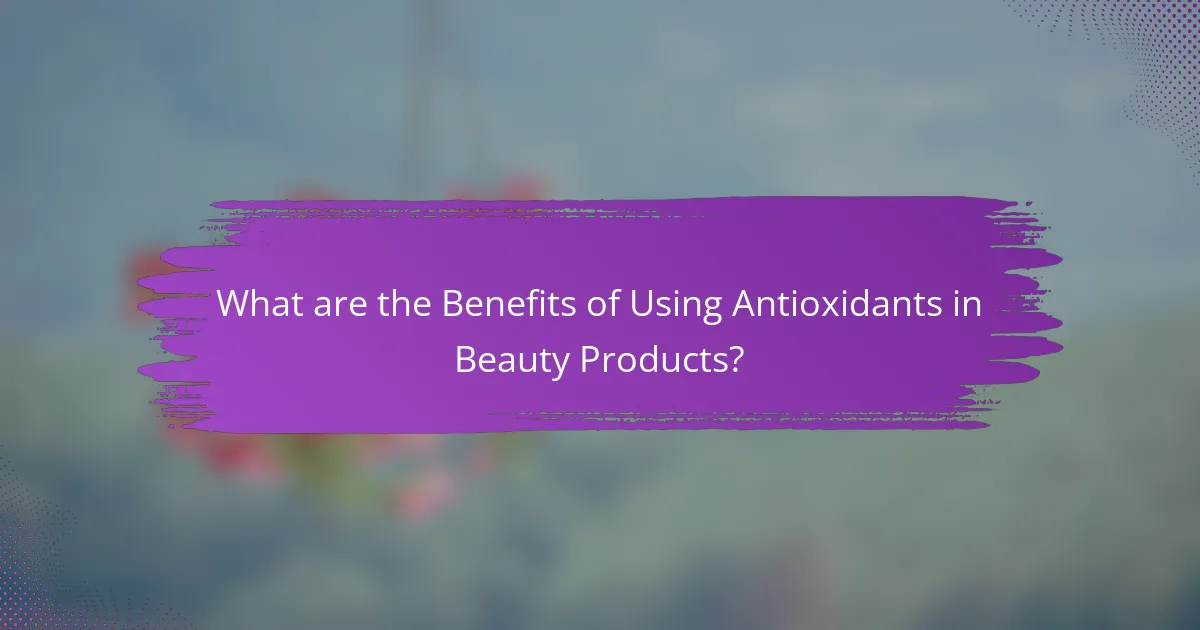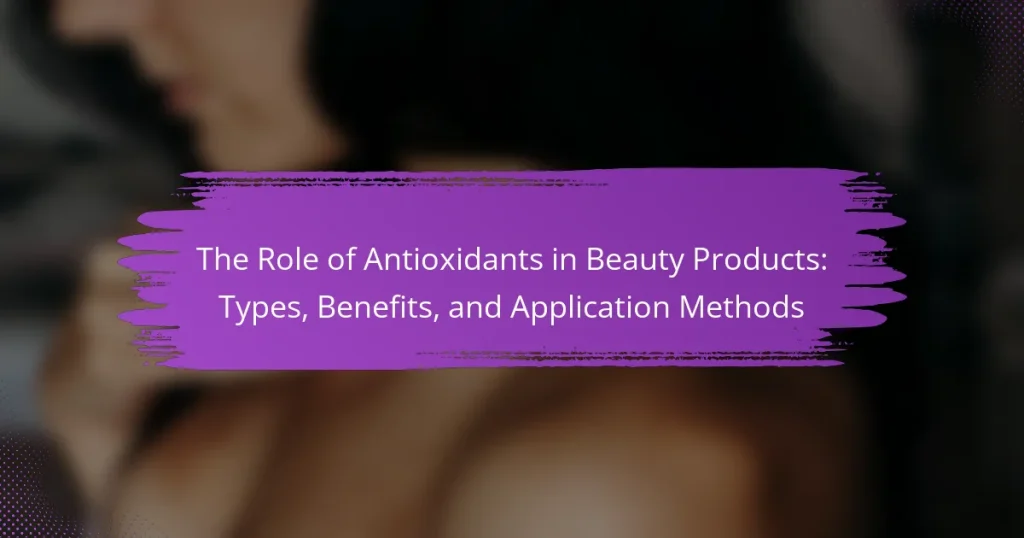Antioxidants are compounds that protect the skin from oxidative stress by neutralizing free radicals, which can lead to skin damage and accelerated aging. Common antioxidants found in beauty products include vitamins C and E, green tea extract, and coenzyme Q10, each offering unique benefits such as improving skin texture, promoting healing, and reducing inflammation. Research indicates that these antioxidants not only enhance the effectiveness of sunscreens but also contribute to a healthier, more youthful appearance. This article explores the various types of antioxidants, their benefits for skin health, and application methods in beauty products.

What are Antioxidants and Their Role in Beauty Products?
Antioxidants are compounds that prevent oxidative stress in the skin. They neutralize free radicals, which can damage skin cells and accelerate aging. Common antioxidants in beauty products include vitamins C and E, green tea extract, and coenzyme Q10. These ingredients help improve skin texture and tone. They also promote healing and reduce inflammation. Clinical studies show that antioxidants can enhance the effectiveness of sunscreens. This combination offers better protection against UV damage. Overall, antioxidants play a crucial role in maintaining youthful and healthy skin.
How do antioxidants function in skincare?
Antioxidants function in skincare by neutralizing free radicals. Free radicals are unstable molecules that can damage skin cells. This damage leads to premature aging and other skin issues. Antioxidants, such as vitamins C and E, donate electrons to free radicals. This process stabilizes the free radicals, preventing further harm. Research shows that antioxidants can improve skin texture and tone. They also enhance the effectiveness of sunscreen. By incorporating antioxidants, skincare products can provide protective and restorative benefits.
What are the main types of antioxidants used in beauty products?
The main types of antioxidants used in beauty products include vitamins C and E, coenzyme Q10, and green tea extract. Vitamin C is known for its brightening properties and ability to neutralize free radicals. Vitamin E helps to moisturize the skin and protect against oxidative damage. Coenzyme Q10 is effective in reducing the appearance of fine lines and wrinkles. Green tea extract contains polyphenols that provide anti-inflammatory benefits. These antioxidants are commonly included in formulations to enhance skin health and appearance.
How do antioxidants protect the skin from damage?
Antioxidants protect the skin from damage by neutralizing free radicals. Free radicals are unstable molecules that can cause oxidative stress. This stress leads to premature aging and skin damage. Antioxidants, such as vitamins C and E, donate electrons to stabilize free radicals. This action prevents cellular damage and supports skin health. Studies show that antioxidants can improve skin texture and tone. For example, vitamin C has been proven to enhance collagen synthesis. Additionally, antioxidants can reduce inflammation and redness in the skin.
Why are antioxidants important in beauty routines?
Antioxidants are important in beauty routines because they protect the skin from oxidative stress. Oxidative stress is caused by free radicals, which can damage skin cells and accelerate aging. Antioxidants neutralize these free radicals, helping to maintain skin health. Common antioxidants include vitamins C and E, green tea extract, and coenzyme Q10. Studies show that vitamin C can improve skin elasticity and reduce wrinkles. Additionally, antioxidants can enhance the effectiveness of sunscreens, providing added protection against UV damage. Incorporating antioxidants into beauty products can result in a more youthful and radiant complexion.
What specific skin concerns do antioxidants address?
Antioxidants address several specific skin concerns. They help reduce signs of aging, such as fine lines and wrinkles. Antioxidants also combat oxidative stress caused by environmental factors like pollution and UV radiation. They can improve skin tone and texture by promoting cell regeneration. Additionally, antioxidants assist in reducing inflammation, which can lead to conditions like acne and redness. Research indicates that vitamin C, a powerful antioxidant, can enhance collagen production, further improving skin elasticity. Studies show that antioxidants can protect skin from sun damage, supporting overall skin health.
How do antioxidants contribute to overall skin health?
Antioxidants contribute to overall skin health by neutralizing free radicals. Free radicals are unstable molecules that can damage skin cells. This damage accelerates aging and can lead to skin issues. Antioxidants, such as vitamins C and E, help protect the skin from oxidative stress. They also promote collagen production, enhancing skin elasticity. Studies show that topical application of antioxidants can improve skin texture and reduce signs of aging. For instance, a study published in the Journal of Clinical and Aesthetic Dermatology found that vitamin C can significantly improve skin appearance. Overall, antioxidants are essential for maintaining healthy, youthful skin.

What Types of Antioxidants are Commonly Found in Beauty Products?
Common antioxidants found in beauty products include vitamin C, vitamin E, and green tea extract. Vitamin C is known for its ability to brighten skin and reduce signs of aging. It helps in collagen synthesis and protects against UV damage. Vitamin E acts as a moisturizer and enhances skin barrier function. It also provides protection from oxidative stress. Green tea extract contains polyphenols that combat inflammation and soothe the skin. Other antioxidants include resveratrol, coenzyme Q10, and niacinamide. Research supports the efficacy of these antioxidants in improving skin health and appearance.
What are the most popular antioxidant ingredients in skincare?
The most popular antioxidant ingredients in skincare include vitamin C, vitamin E, and green tea extract. Vitamin C is known for its brightening properties and ability to neutralize free radicals. It helps improve skin texture and reduce signs of aging. Vitamin E works as a powerful moisturizer and protects skin from oxidative stress. Green tea extract is rich in polyphenols, providing anti-inflammatory benefits and calming effects. Other notable antioxidants include coenzyme Q10 and resveratrol, which also contribute to skin health. These ingredients are frequently included in formulations due to their proven efficacy in enhancing skin appearance and preventing damage.
How does Vitamin C benefit the skin?
Vitamin C benefits the skin by promoting collagen production. This nutrient helps to reduce wrinkles and improve skin elasticity. Vitamin C also acts as an antioxidant, protecting skin cells from damage caused by free radicals. It aids in skin brightening by inhibiting melanin production, which can reduce dark spots. Additionally, Vitamin C enhances the skin’s natural healing process and can improve the appearance of acne scars. Research shows that topical application of Vitamin C can increase skin hydration levels. A study published in the Journal of Clinical and Aesthetic Dermatology found that Vitamin C significantly improves skin texture and overall appearance.
What role does Vitamin E play in beauty products?
Vitamin E acts as an antioxidant in beauty products. It protects the skin from oxidative stress caused by free radicals. This protection helps prevent premature aging. Vitamin E also moisturizes the skin, enhancing its hydration levels. Additionally, it aids in skin repair and improves overall skin texture. Studies show that topical application of Vitamin E can reduce the appearance of scars. It is commonly found in creams, serums, and lotions for its beneficial properties. These roles make Vitamin E a valuable ingredient in the beauty industry.
Are there unique antioxidants that stand out in beauty formulations?
Yes, there are unique antioxidants that stand out in beauty formulations. For instance, astaxanthin is a powerful antioxidant derived from microalgae. It is known for its ability to protect the skin from UV damage. Another notable antioxidant is niacinamide, which helps improve skin texture and reduce inflammation. Resveratrol, found in red wine, is also recognized for its anti-aging properties. These antioxidants are often included in formulations for their specific benefits. Studies show that astaxanthin can be 6000 times more effective than vitamin C in combating free radicals. Such unique antioxidants enhance the efficacy of beauty products significantly.
What are the benefits of lesser-known antioxidants like CoQ10?
CoQ10, or Coenzyme Q10, is a powerful antioxidant with several benefits. It helps neutralize free radicals, reducing oxidative stress in the skin. This action can promote a more youthful appearance by minimizing wrinkles and fine lines. CoQ10 also supports skin cell energy production, enhancing overall skin vitality. Research indicates that topical application of CoQ10 can improve skin hydration and elasticity. A study published in the Journal of Cosmetic Dermatology found that CoQ10 can significantly reduce the appearance of aging signs in the skin. Additionally, it may protect against UV damage, further contributing to skin health.
How do plant-based antioxidants differ from synthetic ones?
Plant-based antioxidants differ from synthetic ones primarily in their origin and composition. Plant-based antioxidants are derived from natural sources like fruits, vegetables, and herbs. They contain a complex mixture of phytochemicals that work synergistically. These compounds include flavonoids, vitamins, and carotenoids, which provide various health benefits.
Synthetic antioxidants, on the other hand, are chemically manufactured. They often consist of isolated compounds designed to mimic natural antioxidants. Synthetic options may lack the full spectrum of benefits found in plant-based antioxidants.
Studies have shown that plant-based antioxidants can offer superior bioavailability and effectiveness in neutralizing free radicals. For example, a study published in the Journal of Agricultural and Food Chemistry demonstrated that natural antioxidants from berries were more effective than synthetic alternatives in reducing oxidative stress.

What are the Benefits of Using Antioxidants in Beauty Products?
Antioxidants in beauty products offer multiple benefits for skin health. They protect the skin from oxidative stress caused by free radicals. This oxidative stress can lead to premature aging and skin damage. Antioxidants help neutralize these harmful free radicals effectively. Common antioxidants include vitamins C and E, which are known for their skin-rejuvenating properties. Research indicates that vitamin C can improve skin texture and brightness. Additionally, antioxidants can enhance the effectiveness of sunscreen. They work synergistically to provide a more comprehensive defense against UV damage. Overall, incorporating antioxidants into beauty products promotes healthier, more youthful-looking skin.
How do antioxidants enhance the efficacy of skincare products?
Antioxidants enhance the efficacy of skincare products by neutralizing free radicals. Free radicals are unstable molecules that can damage skin cells, leading to premature aging. Antioxidants, such as vitamins C and E, protect the skin by donating electrons to these free radicals. This process stabilizes the free radicals and reduces oxidative stress. Studies show that topical application of antioxidants can improve skin texture and reduce signs of aging. For example, a study published in the Journal of Investigative Dermatology found that vitamin C can significantly improve skin appearance and firmness. By incorporating antioxidants, skincare products can provide greater protection and promote healthier skin.
What results can users expect from antioxidant-rich products?
Users can expect improved skin health from antioxidant-rich products. These products help neutralize free radicals that cause oxidative stress. This reduction in oxidative stress can lead to a more youthful appearance. Antioxidants may also enhance skin hydration and elasticity. Studies show that vitamin C, a common antioxidant, can brighten skin tone. Research indicates that products containing green tea extract reduce signs of aging. Additionally, antioxidants can help protect against UV damage. Overall, users may experience smoother, more radiant skin with regular use of these products.
How do antioxidants improve skin texture and appearance?
Antioxidants improve skin texture and appearance by neutralizing free radicals. Free radicals cause oxidative stress, leading to skin aging and damage. Antioxidants, such as vitamins C and E, help protect skin cells. They promote collagen production, which enhances skin firmness and elasticity. Studies show that vitamin C can reduce the appearance of fine lines and wrinkles. Additionally, antioxidants improve skin hydration and brightness. They can also reduce inflammation, leading to a more even skin tone. Overall, antioxidants contribute to healthier, smoother, and more radiant skin.
What are the long-term benefits of incorporating antioxidants into a beauty regimen?
Incorporating antioxidants into a beauty regimen offers several long-term benefits. Antioxidants protect the skin from oxidative stress caused by free radicals. This protection helps prevent premature aging signs such as wrinkles and fine lines. Over time, regular use of antioxidants can improve skin texture and tone. They also promote skin healing and reduce inflammation. Studies show that antioxidants like vitamin C can enhance collagen production. Increased collagen leads to firmer and more youthful-looking skin. Furthermore, antioxidants can help reduce hyperpigmentation and uneven skin tone. Overall, their consistent use contributes to healthier, more resilient skin.
How do antioxidants help in preventing premature aging?
Antioxidants help in preventing premature aging by neutralizing free radicals in the body. Free radicals are unstable molecules that can damage skin cells and accelerate aging. Antioxidants, such as vitamins C and E, donate electrons to stabilize these free radicals. This action reduces oxidative stress, which is a key factor in skin aging. Research shows that antioxidants can improve skin elasticity and hydration. A study published in the Journal of Clinical and Aesthetic Dermatology found that topical antioxidants significantly reduce signs of aging. By protecting skin from environmental damage, antioxidants play a crucial role in maintaining youthful skin.
What impact do antioxidants have on skin tone and brightness?
Antioxidants improve skin tone and brightness by neutralizing free radicals. Free radicals can cause oxidative stress, leading to dullness and uneven skin tone. Antioxidants like vitamin C and E promote collagen production. This enhances skin elasticity and firmness, contributing to a brighter appearance. Studies show that vitamin C can reduce hyperpigmentation. It helps in evening out skin tone and promoting radiance. Regular use of antioxidant-rich products can result in visibly healthier skin.
How can antioxidants be effectively applied in beauty routines?
Antioxidants can be effectively applied in beauty routines through serums, creams, and masks. These products often contain ingredients like vitamin C, vitamin E, and green tea extract. Applying antioxidant serums after cleansing can enhance skin protection against free radicals. Moisturizers with antioxidants help to hydrate and nourish skin while providing additional defense. Masks infused with antioxidants can offer concentrated treatment for skin rejuvenation. Regular use of these products can improve skin texture and tone. Research indicates that antioxidants can reduce signs of aging and promote a healthier complexion. For example, a study published in the Journal of Cosmetic Dermatology found that topical vitamin C significantly improves skin appearance and elasticity.
What are the best application methods for antioxidant products?
The best application methods for antioxidant products include topical application, ingestion, and infusion in formulations. Topical application allows direct delivery to the skin, enhancing absorption. Ingestion of antioxidant-rich foods or supplements promotes systemic benefits. Infusion in creams, serums, or masks ensures prolonged contact with the skin. Studies show that antioxidants can reduce oxidative stress and improve skin health. For example, vitamin C in serums has been proven to brighten skin and reduce signs of aging.
How can one maximize the benefits of antioxidants in skincare?
To maximize the benefits of antioxidants in skincare, incorporate products with high concentrations of these compounds. Look for ingredients like vitamin C, vitamin E, and ferulic acid in formulations. Use these products consistently for optimal results. Apply antioxidants in the morning to protect against environmental damage throughout the day. Layer them under sunscreen for enhanced efficacy. Choose formulations that include stabilizing agents to maintain potency. Research shows that antioxidants can reduce oxidative stress and improve skin texture. A study published in the Journal of Investigative Dermatology supports the effectiveness of topical antioxidants in reducing signs of aging.
What tips should consumers consider when choosing antioxidant products?
Consumers should consider the source and type of antioxidants in products. Natural antioxidants, like vitamin C and green tea extract, are often more effective. Check for concentration levels; higher concentrations typically yield better results. Look for products with a stable formulation to ensure effectiveness over time. Evaluate the product’s packaging; opaque containers protect antioxidants from light exposure. Research the brand’s reputation and ingredient transparency. Read reviews to gauge real user experiences. Finally, consult with a dermatologist for personalized recommendations based on skin type and concerns.
Antioxidants are compounds that play a vital role in beauty products by preventing oxidative stress and neutralizing free radicals, which can damage skin cells and accelerate aging. This article explores the types of antioxidants commonly used in skincare, such as vitamins C and E, coenzyme Q10, and green tea extract, along with their specific benefits, including improved skin texture, tone, and protection against UV damage. Additionally, it discusses effective application methods and tips for consumers to maximize the benefits of antioxidants in their beauty routines. Overall, understanding antioxidants is essential for maintaining youthful and healthy skin.


